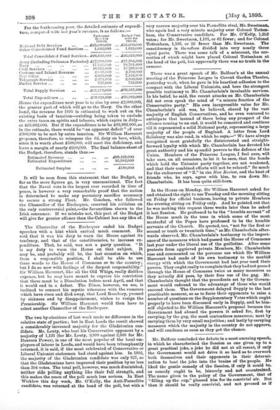In the House on Monday, Sir William Harcourt asked for
and obtained the right to use Tuesday and the morning sitting on Friday for official business, leaving to private Members the evening sitting on Friday only. And he pointed out that he was making this request three weeks later than he asked- it last Session. He professed to be the "humble servant" of the House much in the tone in which some of the most masterful of the Popes have professed to be the humble servants of the Church. He quoted, too, "not for the first or second or tenth or twentieth time," as Mr. Chamberlain after- wards observed, Mr. Chamberlain's testimony to the import- ance of the measures which had passed the House of Commons last year under the liberal use of the guillotine. After some protests from aggrieved private Members, Mr. Chamberlain rose and commented on the perverse use which Sir William Harcourt had made of his own testimony to the morbid energy with which the Government had last year used their powers. They ought really to complain that they had not passed through the House of Commons twice as many measures as they actually did pass, by their free use of the gag. Mr. Chamberlain thought that the precedents set by the Govern- ment would redound to the advantage of those who would succeed them. The Government delayed Supply to the last practicable moment, so as to force their opponents to raise a number of questions on the Supplementary Votes which ought properly to have been discussed early in Supply, and he him- self objected to Sir William Harcourt's proposal because the Government had abused the powers it asked for, first by carrying, by the gag, the most contentious measures; next by carrying them by very small majorities ; and lastly by carrying measures which the majority in the country do not approve, and will condemn as soon as they get the chance.






































 Previous page
Previous page